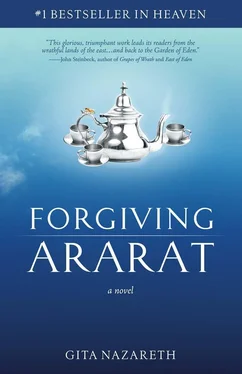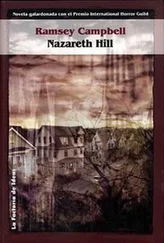Nana must have heard my scream; she entered the room without knocking, dressed in her pajamas and a flower print bathrobe. Through the hall window behind her, the faint gray shadows of dawn dissolved into a morning blue sky streaked orange with the rays of four different suns rising over the Brandywine Valley through the prism of four different seasons and merging into one brilliant fiery ball. It was beautiful.
“Are you ok, dear?” she asked with concern in her voice.
“It isn’t real,” I said calmly, pointing out the bedroom window. “It’s scripted and mechanical…a dream…like you.”
Nana opened the window, allowing the scents and temperatures of the four seasons to flood into the room in equal and opposite waves, canceling each other into one temperate climate.
“But it’s not a dream, dear,” she corrected me, dusting small mounds of yellow tree pollen and powdery white snow from the windowsill. “During your life you only dreamed of being awake.” She started making the bed, ignoring the fact that the sheets were soaked with blood. Pulling the comforter taut, she said: “Let’s go downstairs and have breakfast; I made carrot muffins just the way you like. We can go on that hike up Tussey Mountain later today. I know you were looking forward to it.”
I watched her, amused by the dream. “But it isn’t morning and I’m not awake yet,” I insisted. “If I were awake, you’d be gone, so I think we’d better change the subject.” Nana placed her hand on my arm-an old woman’s hand, wrinkled and rough against my skin; she was trying to convince me that I wasn’t dreaming; the effect was authentic, but I wasn’t impressed. “Dead people don’t talk to each other,” I said. “And they don’t have eyes to see each other or bodies to touch each other.”
She squeezed my arm. “That’s true, dear,” she said. “But it’s easier now for you to think of death that way. You aren’t ready yet to let go of life.”
“But I’m not dead,” I said, “look-”
I jumped up and down, doing a little jig in the bedroom and waving my arm around to prove it.
Nana indulged me with a smile. “You know,” she said, “I remember the shoe. Your mother shouldn’t have slapped you like that; I would have been scared too. I can’t imagine what she was thinking. Making a three year old kiss an old dead woman? Yuck.”
I looked at her in sheer horror. This was one of those nightmare moments just before waking when the thing you’ve been dreading is about to happen and you know you’re powerless to stop it-the moment that produces maximum terror, causing you to scream out in the middle of the night-which is exactly what I did. I ran down the stairs shouting “Nooooo!” at the top of my lungs. Through the kitchen and out the back door I ran, past the sink cluttered with baking dishes and the table with the plate of fresh carrot muffins. I stopped on the back porch and closed my eyes, hoping it would all go away; I even imagined reaching across the bed for Bo and finding his hip with his boxer shorts bunched up, and his legs, warm and downy, pulled up to his chest. I nuzzled close, contouring my body to his, the way a river conforms to the shape of its bank, defining itself by what it is not; his skin smelled masculine and strong and his whiskers thrilled my arm when it brushed his chin; I kissed him on the back of the neck and adjusted my breath to the gradual expansion and contraction of his chest. He stirred and smacked his lips softly. It must have been two or three in the morning because I swore I could hear the faint laughter of the college students who lived on our street returning home from their Friday night parties. But when I opened my eyes to see the clock on the dresser, I found myself still standing on Nana’s back porch in Delaware with the seasons-and my sanity-colliding.
“Bo! Bo!” I yelled.
“Brek, honey, it’s ok,” Nana called from the kitchen. “I’m right here.”
“Bo! Hold me! Hold me!”
But I couldn’t feel him anymore. I leaped from the porch and raced around the house, hoping a sudden burst of exertion would jar me awake. Through winter, summer, spring and fall I ran, past the oak with the tractor tire swing, around the herb garden simultaneously leafy and barren, through beds of tulips dripping with dew and chrysanthemums covered with snow. I tripped over the hump of a root surfacing through the soil beneath the white pine at the northern end of the house and landed face down on the soft needles, my robe spread out around me like the wings of a fallen dove. I stayed there for a moment, catching my breath, inhaling the sweet pine scent and searching for answers-logical, material answers. What was happening to me? Why couldn’t I wake myself up? It was the most terrifying dream I’d ever had.
I brushed the needles from my robe and looked around. The convulsing seasons had transformed the lawn into a paradise of climates-an entire year of days condensed into a single, dazzling moment of nature in rebellion against time. The apple tree I’d climbed as a child extended its limbs through all four seasons at once: some branches in blossom, some leafy, others tipped with ripe green apples and still others bare, like an unfinished painting. I reached from spring into winter, scooped up a handful of snow, and watched in amazement as the summer sun melted it into water that evaporated and began falling as rain on the other side of the lawn. Even more wondrous than this was the light produced by the coupling seasons: the rays of four suns, describing four distinct arcs across the sky, fusing into a shimmering aurora that passed through the objects it touched like an X-ray, exposing every darkness and allowing no possibility of shadow. The light was a feeling more than a physical phenomenon-a pervasive sentiment of brightness, uninhibited by the laws of physics and obedient only to the lawlessness of joyful emotion. I rose to my feet and twirled with my head back, dissolving into the light like my handful of snow, drinking in its warmth, allowing it to flush away my fears.
When I stopped spinning I saw my car, for the first time, parked behind the rhododendrons. The magical light retreated, taking with it the idea that this was all a dream, as if reason itself had been a passenger trapped in the car, waiting to be released by my glance. Hot and cold, night terrors, hallucinations. A fever? Yes, of course. A fever would explain everything that had been happening to me! I even remembered not feeling well on Friday and wondering whether I was catching a cold, that my skin had felt cool and damp. I gazed around the lawn again and up at the house; I looked down at my legs and feet and flexed my left hand. Everything was right where it was supposed to be, and everything worked as it was supposed to work. Only the seasons were out of place, and that surely could be the result of a fever. I must have driven to my grandparents’ house in some sort of delirium and collapsed.
Nana was gone when I went back inside. The dishes in the sink were put away, the counter cleaned. A thin film of dust coated everything, as though it hadn’t been used in weeks. The oven was cool. Not even the aroma of the muffins lingered in the air. I had made it all up after all. I really was at my grandparents’ house in Delaware.
I ran upstairs to the bathroom and looked at myself in the mirror. There was my black hair, intact but disheveled, and ashen skin and bloodshot eyes. Carefully, I pulled open my robe. The holes in my chest and the red stains were gone. I laughed ruefully for having even looked. I took the mercury thermometer from the medicine cabinet and slipped it under my tongue: it read one hundred and six, confirming my self-diagnosis. I obviously needed to get to a doctor, but equally obvious: I was alive .
Читать дальше












